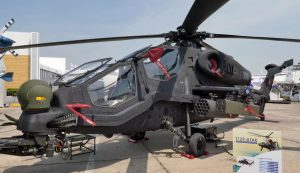The Philippines expects the delivery of two Turkey-made T-129 Tactical Reconnaissance and Attack (ATAK) helicopters in September, the defense department said Tuesday.
The delivery is part of a larger effort by Manila to bolster its defense as it negotiates the renewal of a key military agreement with Washington and copes with continued Chinese incursions in the disputed South China Sea.
Defense Secretary Delfin Lorenzana said the Philippine Air Force had bought a total of six T-129 attack helicopters, developed by Turkish Aerospace Industries, for around $269.4 million as it seeks to modernize its helicopter fleet.
President Rodrigo Duterte said in January he wanted to buy more helicopters after a Vietnam War-era Huey helicopter, still in use by the military, crashed in Bukidnon, killing seven.
The T-129 deal reportedly required the United States to approve export licenses to Turkey as the engines powering the helicopters are produced by the American defense contractor Honeywell, along with the British company Rolls-Royce.
The U.S. has signaled a willingness to continue sanctioning arms sales to the Philippines, which it considers a key Asia-Pacific security ally. This has come despite the objections of some congressional Democrats, who have called for security assistance to be halted until the Duterte administration commits to human rights reforms.
Duterte said in February the U.S. must “pay” to renew the Visiting Forces Agreement (VFA), a key military pact that allows U.S. troops to be stationed in the Philippines.
Jose Manuel Romualdez, the Philippine ambassador to the United States, said in a subsequent op-ed in the Philippine Star that Duterte meant his country’s military “must be equipped with new aircraft and other hard assets.”
The U.S. turned over a C-130 plane to the Philippines in February, the first of two the Philippines plans to acquire. The U.S. also approved two possible attack helicopter sales last year totaling up to $2 billion. Lorenzana has said the Philippines will likely pursue a smaller purchase due to budgetary constraints.
The Philippines also signed a $103.5 million contract with Japan last year to purchase advanced air surveillance radars, which marks Japan’s first complete arms export since 1967. The Mitsubishi-built radars are optimized for aerial surveillance at medium to high altitudes.
Both Washington and Tokyo have been eager to deepen their ties with Manila to retain it as an ally amid China’s expanding presence in the South China Sea – and with a likely interest in tempering Duterte’s periodic Beijing-friendly impulses.
The Philippines has protested recent incursions by Chinese ships into Philippine-claimed areas of the South China Sea. Earlier this month, Foreign Secretary Teodoro Locsin took to Twitter to tell China to “get the f**k out” of Philippine territorial waters.
Duterte, however, has attempted to maintain a warm relationship with Beijing, which funds several of his administration’s key infrastructure products and has donated Chinese-made vaccines to the Philippines.
The president recently imposed a gag order among his cabinet over the South China Sea, meaning Locsin may be asked to log off before conducting any future diplomacy.

































